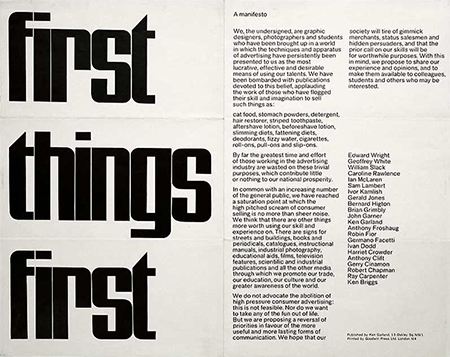First Things First: Designers of the world, unite!
Posted in Content
November 2019
2 minutes reading time
Way back in ‘64 when the Beatles were at the heights of doing their mopped-topped thing, British designer Ken Garland and a bunch of 21 chums issued a manifesto entitled ‘First Things First.’

The manifesto was aimed directly at graphic designers and was a pretty ballsy appeal to reject the day-to-day nonsense of ‘commercial’ design (stuff like dog biscuits, coffee, and, hair gel), in favour of what was defined as ‘socially useful’ graphic design.
Designers who devote their efforts primarily to advertising, marketing and brand development are supporting, and implicitly endorsing, a mental environment so saturated with commercial messages that it is changing the very way citizen-consumers speak, think, feel, respond and interact. To some extent we are all helping draft a reductive and immeasurably harmful code of public discourse.
Scary innit? And quite oracle-y in the context of today…given the amount of social nonsense we devour on a daily basis…however, let’s get back to the manifesto…
There are pursuits more worthy of our problem-solving skills. Unprecedented environmental, social and cultural crises demand our attention. Many cultural interventions, social marketing campaigns, books, magazines, exhibitions, educational tools, television programs, films, charitable causes and other information design projects urgently require our expertise and help.
Personally, I was always a big fan of the sentiment.
But sentiment don’t pay the bills, right?
And judging by some of the portfolios I’ve recently viewed, not everyone has the opportunity to work with such lovely stuff.
And – on top of all that…we’re always going to struggle with some kinda ism…be it consumer, material, aesthetic, amoral…whatever…
Don’t get me wrong, when it comes to plying my trade, I’ll always try and do the right thing…so don’t think for a second I’m giving First Things First the elbow. Far from it.
I guess it’s what’s achievable, attainable or realistic when there’s a mortgage to be paid.
There’s only so many design freebies we can do for the local charity without feeling just a bit exploited…or maybe not.
However.
Here’s something to think about.
There’s a bit in the manifesto that’s actually really achievable for all of us. It’s the bit that talks about ‘a reversal of priorities in favour of more useful, lasting and democratic forms of communication’.
Communications for the many not the few (other party-political straplines are available).
So, for example, the many could be the 5.5 million people in the UK who (for one reason or another) don’t access the internet. The many could be the 1 million people whose first language isn’t English, or the 25 million people over 50 suffering from the visual, hearing and dexterity issues old age often brings. The many might be the 11 million disabled people who use some form of assisted technology, or perhaps they’re the 2.8 million people in the UK with autism who struggle to relate to smiley people featured in stock imagery… you get the picture.
Isn’t it the responsibility of all us to ensure we communicate fairly to everyone? Surely, it’s better for brands, organisations, government bodies – whoever - to be totally inclusive? It’s certainly better for the end user. Isn’t that what ‘democratic communication’ should be?
If you want to do really good design that will actually make a positive difference - start thinking about our diverse range of consumers and how they’ll consume the information you’re happy to send them.


.jpg?width=352&name=181023-Propel@YH-Boot-Camp-Afternoon-Session-Dom-Baker-%26-Seb-WR-0103-(1).jpg)